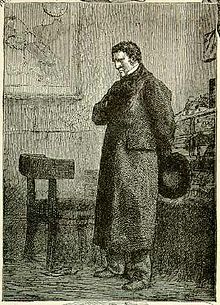Jean Valjean
| Jean Valjean | |
|---|---|
| Les Misérables character | |

Jean Valjean disguised as Monsieur Madeleine. Illustration by Gustave Brion.
|
|
| Created by | Victor Hugo |
| Information | |
| Full name | Jean Valjean |
| Nickname(s) | Monsieur Leblanc |
| Aliases |
Monsieur Madeleine Ultime Fauchelevent Urbain Fabre Prisoner 24601 Prisoner 9430 |
| Gender | Male |
| Occupation |
Tree pruner Businessman Mayor of Montreuil-sur-Mer |
| Family |
Jean Valjean Sr. (father) Jeanne Mathieu (mother) Jeanne (sister) Unnamed brother Seven unnamed nieces and nephews |
| Children | Cosette (surrogate daughter; no legal or blood relation) |
| Relatives |
Unnamed brother-in-law Marius Pontmercy (adoptive son-in-law) |
| Religion | Roman Catholic |
| Nationality | French |
| Born | 1769 |
| Death | 1833 (aged 64) |
Monsieur Madeleine
Ultime Fauchelevent
Urbain Fabre
Prisoner 24601
Tree pruner
Businessman
Jean Valjean Sr. (father)
Jeanne Mathieu (mother)
Jeanne (sister)
Unnamed brother
Unnamed brother-in-law
Jean Valjean is the protagonist of Victor Hugo's 1862 novel Les Misérables. Hugo depicts the character's 19-year-long struggle to lead a normal life after serving a prison sentence for stealing bread to feed his sister's children during a time of economic depression and various attempts to escape from prison. Valjean is also known in the novel as Monsieur Madeleine, Ultime Fauchelevent, Monsieur Leblanc, and Urbain Fabre.
Valjean and Police Inspector Javert, who repeatedly encounters Valjean and attempts to return him to prison, have become archetypes in literary culture. In the popular imagination, the character of Jean Valjean came to represent both Hugo himself and leftist sentiment. In 1871, when Hugo was living in Brussels during the radical revolt known as the Paris Commune, anti-revolutionary mobs attacked his house and broke windows shouting "Down with Jean Valjean!"
As a parolee Valjean is issued a yellow "feuille de route" for travel to Pontarlier, where he will be forced to live under severe restrictions. This document, often called a "passeport jaune" (yellow passport), identifies him to all as a former convict and immediately brands Valjean an outcast wherever he travels. Bishop Myriel of Digne, from whom he steals valuable silverware, tells the police that he has given the treasure to Valjean. Out of this encounter, Valjean becomes a repentant, honorable, and dignified man. He is kind to all he encounters, a devoted substitute father to a girl who loses her mother, Fantine, and a benefactor to those in need. Though a known criminal and a parolee, Valjean yet grows morally to represent the best traits of humanity. Valjean occupies a place on the wrong side of the law, but on the right side of human virtues and ethics.
...
Wikipedia
